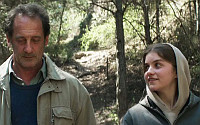| SHADOWS ON THE WALL | REVIEWS | NEWS | FESTIVAL | AWARDS | Q&A | ABOUT | TALKBACK | ||
 Shadows off the beaten path Shadows off the beaten path | ||
| Indies, foreigns, docs, revivals and shorts... | ||
|
On this page:
THE APPARITION |
THE FOREST OF THE LOST SOULS THE HEIRESSES | SICILIAN GHOST STORY < < F O R E I G N > > last update 3.Aug.18 See also: SHADOWS FILM FESTIVAL |
||
 R E V I E W B Y R I C H C L I N E
R E V I E W B Y R I C H C L I N E | ||
The Apparition
 L’Apparition L’Apparition
| ||
|
dir-scr Xavier Giannoli prd Olivier Delbosc with Vincent Lindon, Galatea Bellugi, Patrick d'Assumcao, Anatole Taubman, Elina Lowensohn, Claude Leveque, Gerard Dessalles, Bruno Georis, Alicia Hava, Candice Bouchet, Aurore Broutin, Axelle Simon  release Fr 14.Feb.18,
release Fr 14.Feb.18, UK 3.Aug.18 18/France 2h20
|  There's a strong sense of intrigue in this gently growing mystery drama, exploring some provocative themes through the eyes of vivid characters. But the film is badly in need of a severe editing. There are so many repetitive or unnecessary moments that 45 minutes could be cut without losing anything vital. Still, every scene is beautifully shot and played.
There's a strong sense of intrigue in this gently growing mystery drama, exploring some provocative themes through the eyes of vivid characters. But the film is badly in need of a severe editing. There are so many repetitive or unnecessary moments that 45 minutes could be cut without losing anything vital. Still, every scene is beautifully shot and played.
After losing a colleague in a war zone, photojournalist Jacques (Lindon) struggles to adjust back in Paris. Out of the blue, the Vatican calls asking him to help validate a vision the young Anna (Bellugi) had of the Virgin Mary. Travelling to small-town France, Jacques puts his trauma aside to dig into this perplexing situation. It seems simple enough on the surface, but neither the the crowds of pilgrims nor the local priest Father Borodine (d'Assumcao) like the idea of this investigation. And Jacques has a nagging feeling that he's nowhere near the truth. Writer-director Giannoli's slow-burn approach is effective in building a sense of mystery, as the characters are fascinatingly enigmatic, and the truth seems just out of reach. There's a sense that this could break out into a Da Vinci Code-style thriller at any moment, even though we know that it won't. Indeed, the journey is mostly internal. Even the questions of faith are a little blurred. This is about a middle-aged man and a teen girl who are grappling with issues from their past in ways that escape even them. Both Lindon and Bellugi are excellent, delivering understated performances that leave plenty for the audience to discover. If the details of each character are a little sketchy, their emotions are raw and vivid. The growing connection between these oddly matched people is complex and surprising, and where each of them goes is unpredictable, as is the way the plot kind of resolves itself in the final coda. There's a lot going on in this film, from the personal odysseys of Jacques and Anna to the crisis of faith and ambition for d'Assumcao's Borrodine, who is caught up in the blur of commercialism with a colleague (Taubman) who has created an entire media and tourism empire out of Anna's vision. In some ways, the languorous plotting dilutes this side of the narrative, because the film is constantly drifting off in other directions, circling back, revisiting clashes we've seen before. So as it continues past the two-hour mark, the audience is a bit numbed to the power of the story and its themes. | |
|
12 themes, language 6.Jun.18
| | |
| R E V I E W B Y R I C H C L I N E | ||
The Forest of the Lost Souls
 A Floresta das Almas Perdidas A Floresta das Almas Perdidas
| ||
|
dir-scr Jose Pedro Lopes prd Ana Almeida with Daniela Love, Jorge Mota, Mafalda Banquart, Ligia Roque, Tiago Jacome, Lilia Lopes, Debora Ribeiro, Francisco Maria Lopes, Jose Carlos Pereira, Rita Mendes, Sofia Costa, Mariana Nunes  release Por 12.Oct.17,
release Por 12.Oct.17, UK Oct.17 cff, US 3.Aug.18 17/Portugal 1h11 |
 Eerie and unsettling, this brisk Portuguese drama quickly gets under the skin with its minimalistic approach. Set in a mythical forest where people go to commit suicide, the film is strikingly well made, with vivid characters and a jagged sense of humour underscoring the sombre theme. Filmmaker Jose Pedro Lopes cleverly looks beneath the surface, playing with the audience as he shifts it into a stalker thriller.
Eerie and unsettling, this brisk Portuguese drama quickly gets under the skin with its minimalistic approach. Set in a mythical forest where people go to commit suicide, the film is strikingly well made, with vivid characters and a jagged sense of humour underscoring the sombre theme. Filmmaker Jose Pedro Lopes cleverly looks beneath the surface, playing with the audience as he shifts it into a stalker thriller.
In a woodland on the edge of a lake near the Spanish border, Ricardo (Mota) is consumed by thoughts of his teen daughter Irene (Lopes), who drowned herself here. But as he plans his own death, he's interrupted by the acerbic young Carolina (Love), who criticises him for choosing to do it with a knife ("What are you, Japanese?"). Ricardo counters that she's too young to want to kill herself. He borrows a pen and paper from Carolina to write a note, and then some of her poison too. But things take an unexpected turn. Shot evocatively in black and white, the film opens with a depiction of Irene's suicide that hauntingly leads into a fiendishly inventive title sequence that plays on dark, fairy tale horrors. All of which sets the mood for the creepy tale to come. Francisco Lobo's silvery imagery is gorgeous, and writer-director Lopes inventively uses the settings to place his characters in intriguing juxtapositions where they discuss serious themes without getting morbid about them. Love and Mota have terrific banter between them, developing feisty, lively characters who spar with each other about what they should be doing. Love is superb as a smart young woman who sees the world around her a little too clearly. While Mota's Ricardo is a father full of pain, emotionally consumed by guilt. And there's more to the story, as it spirals out to involve Irene's mother (Roque), as well as her sister Filipa (Banquart) and Filipa's boyfriend (Jacome), each played with the same honesty. With such an edgy sense of humour, the film is able to circle around an issue like suicide in surprising ways, exploring sadness and regret, conscience and nihilism, even as events develop in seriously nasty directions. Through all of this, Lopes keeps the audience gripped, continually unearthing surprising feelings even as he expertly stages several heart-stopping freak-out moments. So as it builds to a series of shocks, the film remains thoughtful and deeply unnerving at the same time. | |
|
15 themes, language, violence 30.Jul.18 | ||
 R E V I E W B Y R I C H C L I N E
R E V I E W B Y R I C H C L I N E | ||
The Heiresses
 Las Herederas Las Herederas
| ||
|
dir-scr Marcelo Martinessi prd Marcelo Martinessi, Sebastian Pena Escobar with Ana Brun, Margarita Irun, Ana Ivanova, Nilda Gonzalez, Maria Martins, Alicia Guerra  release Par 5.Apr.18, US Jun.18 siff, UK 7.Sep.18 18/Paraguay 1h38 EDINBURGH FILM FEST
|  A startlingly introspective filmmaking style sets this film apart from the usual self-discovery drama, as it allows the audience to simply take a journey with the central character without ever trying to explain anything. This can sometimes make the film feel rather vague, as key events and relationships are left to the imagination, but it also draws us in to properly feel the weight of what happens.
A startlingly introspective filmmaking style sets this film apart from the usual self-discovery drama, as it allows the audience to simply take a journey with the central character without ever trying to explain anything. This can sometimes make the film feel rather vague, as key events and relationships are left to the imagination, but it also draws us in to properly feel the weight of what happens.
In her old family home in Asuncion, Chela (Brun) is selling off the family furnishings to cover debts accrued by her companion Chiqui (Irun), who is being imprisoned for fraud. Chela can't quite get a grip on the fact that she'll be alone, and she doesn't really count her maid Pati (Gonzalez) in that equation. But to pass the time, she begins working as a taxi driver for a group of older women. One of her other regular passengers is the younger Angy (Ivanova), whose confidence is very attractive, and perhaps inspirational as well. Writer-director Martinessi keeps the cameras up close, following Chela so tightly that there's very little context to the settings she finds herself in. And the dialog is all very natural, without any exposition at all. Chela and Chiqui seem to be much more than just friends, although nothing is ever said or shown to clarify their relationship. But this still adds a sharp edge to Chela's interest in Angy while Chiqui is in jail. As do the times when Chela visits Chiqui in prison, and those scenes are messy and bewildering, as they should be. This naturalistic style makes everything that happens bracingly honest. This is certainly not like a fly-on-the-wall reality-TV show, because no one is playing up for the cameras, and the cast members continually reveal tiny details in their movements and voices, but not necessarily in the words they say. Brun is simply wonderful, conveying Chela's arc with seriously layered depth. Her scenes with both Irun and Ivanova bristle with the connections she has with each woman, while subtly revealing her thoughts about them as well. Films like this can be a chore for audiences that like everything spelled out plainly for them. But viewers who like a challenge will be rewarded with a remarkable story of a woman who has always lived in this same house and has always relied on her partner for everything. Watching her find her own voice, interests and passions is seriously beautiful. And seeing her struggle with the decisions she needs to make is both provocative and inspiring. | |
|
12 themes, language 7.Jun.18
| | |
| R E V I E W B Y R I C H C L I N E | ||
Sicilian Ghost Story

| ||
|
dir-scr Fabio Grassadonia, Antonio Piazza prd Carlotta Calori, Francesca Cima, Massimo Cristaldi, Nicola Giuliano with Julia Jedlikowska, Gaetano Fernandez, Corinne Musallari, Lorenzo Curcio, Andrea Falzone, Federico Finocchiaro, Vincenzo Amato, Sabine Timoteo, Nino Prester, Filippo Luna, Vincenzo Crivello, Gabriele Falsetta  release It 18.May.17,
release It 18.May.17, US Oct.17 ciff, UK 3.Aug.18 17/Italy 2h06
|  Lushly shot in gorgeous locations, this film evokes the tone of a fairy tale as it recounts a momentous story of first love. Both realistic and fantastical, sweet and scary, it's skilfully written and directed by Italian duo Fabio Grassadonia and Antonio Piazza. Artfully blurring the lines between a variety of genres, this is the kind of film that gets deep under the skin.
Lushly shot in gorgeous locations, this film evokes the tone of a fairy tale as it recounts a momentous story of first love. Both realistic and fantastical, sweet and scary, it's skilfully written and directed by Italian duo Fabio Grassadonia and Antonio Piazza. Artfully blurring the lines between a variety of genres, this is the kind of film that gets deep under the skin.
At 13, Luna (Jedlikowska) has a crush on her classmate Giuseppe (Fernandez) and follows him into a deep forest. After some teasing, they begin to find a connection, but their blossoming friendship is interrupted when Giuseppe vanishes. Oddly, no one tries to find him. Luna visits Giuseppe's parents, who react bizarrely. And she heads back into the woods looking for clues. Eventually, she becomes convinced that he has been kidnapped, and she grows increasingly furious that everyone is refusing to talk about it. As months and years pass, she never gives up looking. Based on an infamous true story, the film is packed with fable-like imagery, including seemingly sentient animals and moody landscapes. Luna's parents (Amato and Timoteo) are like gothic figures from a storybook; schoolteachers and cops are dismissive. Many scenes play out in silence, without the need for dialog, building drama, emotion and quietly nerve-shredding suspense. Eventually the perspective widens to show Giuseppe's side of the story, which involves the police, the mafia and a fierce code of silence. The story is delicately anchored by Jedlikowska, who creates a spiky, funny, passionate and likeable pre-teen. Her performance is minimalistic but profound, even when events spiral in unnerving directions. Luna is a terrific character, lovelorn and perplexed, tenaciously searching for answers. She's naive, but not as clueless as everyone thinks she is. And Fernandez is excellent in an equally complex role, adeptly navigating some harrowing shifts in tone during Giuseppe's ordeal. Since it centres on two such innocent young people, the film can hardly help but be deeply wrenching. Their separation makes the larger story of criminality, corruption and complicity that much more intense. The yearning and aching of these characters is so vivid that the film is sometimes difficult to watch. But the storytelling is lovingly crafted, which helps hold the interest even in some slowly paced sections. The sensitive, astute filmmaking not only tells a powerful story, but also makes a devastating comment on Sicilian culture. So where this goes is beautifully haunting. | |
|
15 themes, language, sexuality 1.Aug.18 | ||


See also: SHADOWS FILM FESTIVAL © 2018 by Rich Cline, Shadows
on the Wall
| ||